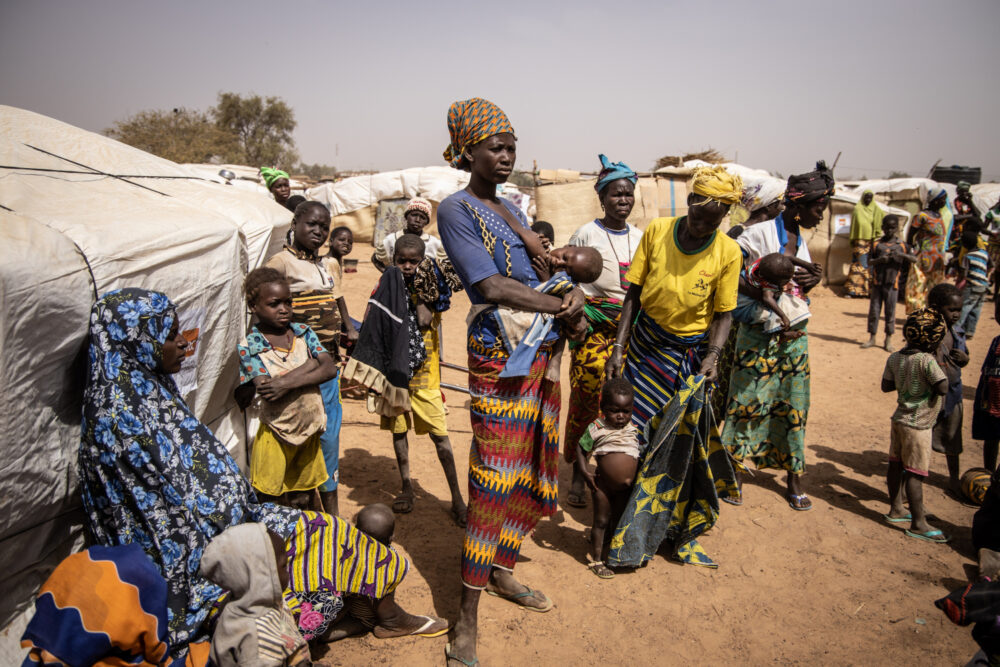Comment les radios au Burkina Faso peuvent-elles s’adapter pour répondre aux besoins d’information des personnes déplacées et lutter contre la désinformation concernant la crise du Covid-19 ? C’est la principale question abordée par une recherche lancée en juin par l’Université de Sheffield et le Centre national de la recherche scientifique et technologique du Burkina, en partenariat avec la Fondation Hirondelle, et soutenue par l’organisation caritative Elrha.
L’étude vise à déterminer comment les radiodiffuseurs du Burkina Faso peuvent s’adapter pour répondre aux besoins d’information des personnes déplacées et combattre la désinformation et la mésinformation concernant la pandémie de COVID-19 et ses effets.
Pour réaliser cette étude, les chercheurs, le Dr Emma Heywood de l’Université de Sheffield et le Dr Lassané Yaméogo du Centre National de la Recherche Scientifique et Technologique du Burkina Faso, travaillent avec les personnes déplacées dans des camps de réfugiés et les communautés d’accueil afin de mieux comprendre leurs préoccupations, de découvrir à quelles rumeurs et messages erronés sur le COVID-19 elles sont exposées, et les sources de cette mésinformation. Les travaux d’analyse comprennent :
– Des consultations des participant.e.s par Whatsapp, ce qui permet d’inclure un plus grand nombre de personnes difficile à atteindre et évite les contacts physiques dans ce contexte Covid
– Des analyses des contenus produits par Studio Yafa pour voir dans quelle mesure ils répondent aux préoccupations des personnes déplacées
– Une étude d’impact des programmes de Studio Yafa sur l’évolution des connaissances, perceptions et attitudes en lien avec le COVID et la lutte contre la désinformation.
Les conclusions des chercheurs sont ensuite transmises au Studio Yafa, le programme radio de la Fondation Hirondelle au Burkina, diffusé par un réseau de radios partenaires locales dans tout le pays. Les journalistes du Studio Yafa sont alors en mesure d’aborder la désinformation qui circule et touche les personnes déplacées, pour mieux répondre à leurs besoins d’information, dans leurs émissions.
« Fournir des informations précises, régulières et opportunes sur des questions qui impactent la vie comme le COVID-19 est essentiel pour tous et particulièrement pour les groupes vulnérables tels que les personnes déplacées, explique le Dr Emma Heywood. La radio est souvent leur principale source d’information. En travaillant avec une source radio burkinabè de confiance, et grâce à une collaboration participative, nous espérons non seulement sensibiliser cette population aux meilleures pratiques liées à la crise du COVID, mais aussi faire entendre la voix de ces communautés. »
Démarrée en juin 2020, l’étude va durer jusqu’en mars 2021. Les résultats attendus sont les suivants :
– améliorer la sensibilisation, la compréhension et la confiance des populations concernées en ce qui concerne les meilleures pratiques en matière de prévention de la propagation du COVID-19 ;
– accroître la capacité des personnes déplacées et des communautés d’accueil à exprimer leurs préoccupations et leurs besoins en matière d’information ;
– créer une collaboration plus étroite entre les acteurs humanitaires et les médias locaux afin de répondre aux besoins des personnes déplacées de manière plus précise et plus ciblée ;
– renforcer la capacité à identifier et à réfuter les informations erronées de manière plus ciblée et plus rapide ;
– mettre en œuvre une réponse et une participation centrées sur les personnes déplacées, en encourageant la compréhension et la confiance entre les populations touchées et les acteurs humanitaires et de santé publique ;
– encourager une plus grande responsabilisation de ces acteurs à l’égard de la population touchée ;
– renforcer la compréhension intercommunautaire qui contribuera à prévenir les tensions causées par la désinformation, les stéréotypes et les rumeurs.
Ce projet de recherche est financé par le programme de recherche pour la santé dans les crises humanitaires (R2HC) de l’organisation caritative Elrha, qui vise à améliorer les résultats sanitaires en renforçant la base de données pour les interventions de santé publique dans les crises humanitaires. Le programme R2HC est financé par le Département britannique du développement international (DFID), Wellcome, et l’Institut national britannique de recherche en santé (NIHR).

